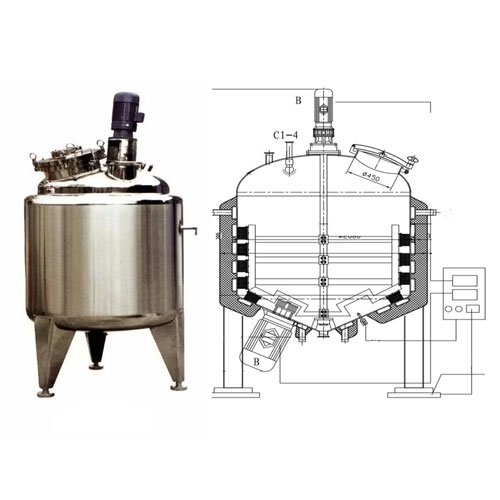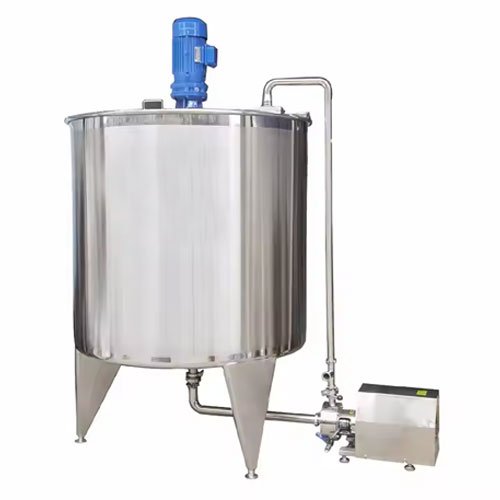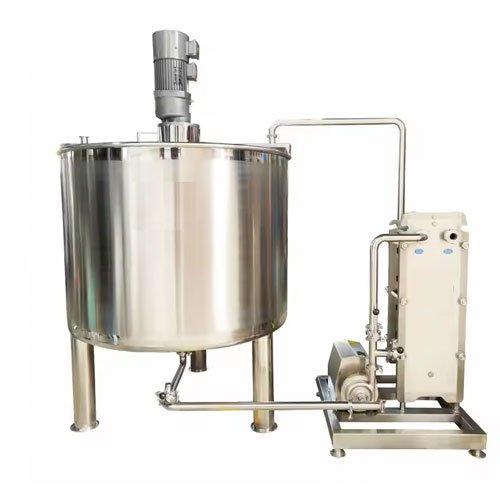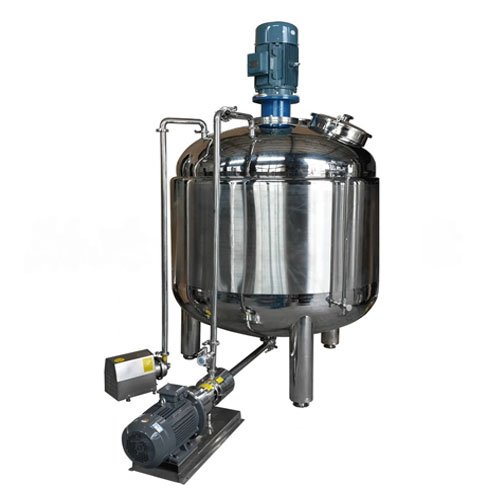A 100-gallon mixing tank is a vital piece of equipment used in various industries, including food and beverage, pharmaceuticals, chemicals, cosmetics, and more. These tanks are designed to mix, blend, and process a variety of liquids, powders, and other materials to achieve consistent product quality. With a capacity of 100 gallons, these mixing tanks offer an ideal balance between large-scale production needs and manageable space requirements.
In this comprehensive guide, we’ll dive into the details of a 100-gallon mixing tank, including its features, uses, and advantages, and help you understand how it plays a crucial role in industries that require efficient and reliable mixing processes.
What is a 100 Gallon Mixing Tank
A 100-gallon mixing tank is a vessel used for blending and mixing a range of substances. This type of tank is typically used for mixing liquids, semi-solids, and powders. Whether you’re producing chemicals, preparing food recipes, or blending cosmetic products, the 100-gallon tank offers a versatile solution for handling various raw materials in a controlled environment.
These mixing tanks come in a variety of designs, including stainless steel, polypropylene, and other materials, each chosen for its ability to withstand the specific requirements of the substances being mixed.
Features of a 100 Gallon Mixing Tank
- Capacity: As the name suggests, a 100-gallon mixing tank holds approximately 100 gallons (or around 378.5 liters) of material, making it suitable for medium to large-scale production processes.
- Construction Materials: Most 100-gallon mixing tanks are made from stainless steel due to its durability, corrosion resistance, and ease of cleaning. Some may also be made from plastic or polypropylene depending on the intended application.
- Mixing Mechanism: The mixing tank often comes equipped with various types of mixing equipment, such as agitators, blades, and paddles, which ensure even distribution of materials. These mixing systems help achieve uniform blending of ingredients, enhancing the quality of the final product.
- Temperature Control: Many 100-gallon mixing tanks are equipped with heating and cooling systems to maintain the desired temperature during the mixing process. This feature is especially important in industries like food production and pharmaceuticals, where temperature control is essential for product integrity.
- Tank Design: Mixing tanks come in a variety of designs, including vertical and horizontal configurations. The tank may have a conical bottom, which facilitates easy drainage, or a flat bottom for uniform mixing.
- Safety Features: Safety is a major concern when dealing with industrial equipment. A 100-gallon mixing tank is often designed with safety features such as pressure relief valves, over-temperature shutoffs, and spill containment to ensure that any potential hazards are minimized.
- Seamless Integration: These tanks are typically designed to be easily integrated with other equipment in the production line, such as pumps, filters, and sensors. This ensures that the tank functions efficiently in conjunction with other machinery.
Uses of a 100 Gallon Mixing Tank
- Food and Beverage Industry: In the food and beverage industry, a 100-gallon mixing tank is used for blending ingredients like sauces, dressings, syrups, juices, and batters. The ability to mix ingredients efficiently and uniformly is critical to ensuring consistent product quality.
- Pharmaceuticals: Pharmaceutical companies use 100-gallon mixing tanks to blend ingredients for drugs and medicinal formulations. These tanks are often equipped with mixing blades or stirrers that ensure the homogeneity of the mixture, which is crucial for product safety and efficacy.
- Chemical Manufacturing: Chemical industries use 100-gallon mixing tanks for creating various chemicals, including detergents, paints, and adhesives. The robust construction of the tank ensures that the materials being mixed do not react negatively with the tank’s surface.
- Cosmetics Industry: The cosmetics industry also relies on mixing tanks to blend creams, lotions, shampoos, and other beauty products. These tanks are designed to handle a variety of viscosities, from thin liquids to thicker pastes.
- Water Treatment: In the water treatment industry, 100-gallon mixing tanks are used for blending chemicals such as coagulants and flocculants. These substances help in purifying water by removing impurities and contaminants.
Advantages of a 100 Gallon Mixing Tank
- Efficiency and Consistency: A 100-gallon mixing tank ensures that the ingredients are mixed thoroughly, providing consistent results every time. This is especially important when producing large quantities of product, as it reduces the risk of human error and maintains quality control.
- Space-Saving: While large enough to handle substantial quantities of materials, a 100-gallon mixing tank still occupies a relatively small footprint compared to larger industrial mixing systems. This makes it ideal for businesses with limited space.
- Cost-Effective: The 100-gallon capacity offers a great balance between operational cost and output, making it more economical than larger tanks. It allows businesses to scale production without investing in overly large equipment.
- Versatility: These tanks are incredibly versatile and can be used in various industries and applications. Their ability to handle a wide range of substances, from liquids to powders, makes them indispensable in many manufacturing processes.
- Durability: Constructed from high-quality materials such as stainless steel, 100-gallon mixing tanks are built to last. They are resistant to rust, corrosion, and wear, ensuring that they provide long-term service.
- Ease of Maintenance: Mixing tanks are typically designed for easy cleaning and maintenance. Stainless steel tanks, in particular, are non-reactive and can be cleaned with minimal effort, ensuring compliance with hygiene standards, especially in food and pharmaceutical industries.
How to Choose the Right 100 Gallon Mixing Tank
When selecting a 100-gallon mixing tank, consider the following factors to ensure it meets your specific needs:
- Material Compatibility: Choose a tank made from materials that are compatible with the substances you plan to mix. For example, if you’re working with corrosive chemicals, a stainless steel tank may be the best choice.
- Mixing Speed and Power: Depending on the materials you need to mix, consider the mixing speed and power. For thick or viscous substances, you may need a more powerful motor or agitator.
- Temperature Control Needs: If your mixing process requires precise temperature control, look for a tank equipped with heating and cooling systems.
- Compliance: Ensure that the mixing tank complies with industry regulations, especially for food and pharmaceuticals, where hygiene and safety standards are strict.
- Customization: Some manufacturers offer custom features, such as agitation systems, specialized coatings, or custom tank designs. Consider whether you need these additional features for your operations.
A 100-gallon mixing tank is an essential piece of equipment for industries that rely on efficient, consistent, and high-quality mixing processes. Whether you’re in the food and beverage industry, pharmaceuticals, chemicals, or cosmetics, a 100-gallon mixing tank offers versatility, durability, and efficiency to meet your production needs. With its various features, such as temperature control, high-quality construction, and customizable options, this tank can help streamline your operations and improve product quality. Make sure to carefully evaluate your needs and choose the right mixing tank to maximize your production efficiency and meet industry standards.









